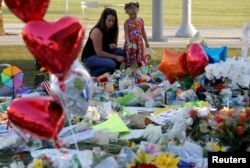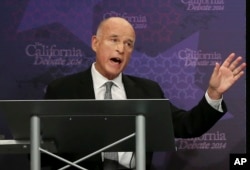The U.S. debate over gun control is on center stage in Washington again this week, but the political battle lines appear hardened against passage of any new restrictions.
Last month's mass shooting at a gay nightclub in Orlando, Florida that left 49 people dead pushed gun control to the forefront in the contentious 2016 political election season, even as fractious Republican and Democratic lawmakers remain as divided as ever.
Leaders of the Republican-controlled House of Representatives said Wednesday they would vote later this week on a measure to try to prevent terrorists from buying guns. But Democrats are opposed to the details of the legislation, with a similar proposal already defeated in the Senate.
Republican Congressman Lee Zeldin of New York said the proposal would "prevent terrorists from purchasing firearms or explosives while protecting the due process rights of Americans." It would require the Justice Department to prove that there is "probable cause" that someone is involved in terrorism before blocking a gun sale, a process that would have to be completed within three days.
But conservative Republicans said that would go too far, imperiling the rights of people to buy guns, and leaving the fate of the legislation in doubt.
Too limited
Meanwhile, House Democrats, about 100 of whom staged a sit-in on the House floor last month to demand action on gun control legislation, say the Republican proposal is too limited and are calling for votes on their proposals to bar anyone on the U.S. no-fly list from buying a gun. Republicans say that idea, also defeated by the Senate, will not even be put to a vote.
Zeldin accused Democrats of opposing the Republican legislation "for no good reason because they only want the political fight."
House Speaker Paul Ryan rejected Democratic calls for votes on their proposals, saying, "We are not going to pass legislation that infringes on anyone's constitutional rights."
House Minority Leader Nancy Pelosi staged a rally on the Capitol steps calling for passage of new restrictions on gun sales. She has described the Republicans' measure as "toothless ... that will do nothing to keep our communities safe." She told supporters Democrats want "real action, not a bill written by the gun lobby."
Larry Pratt, executive director emeritus of the Gun Owners of America, contended in an interview with VOA that Democratic lawmakers are "making a play for our guns right after we celebrated our independence," the country's annual July 4 holiday. But he also said it was "very disappointing" that Ryan is proceeding to go ahead with a gun control vote.
Pratt said the Orlando massacre occurred in a so-called "gun-free zone," where guns are supposedly prohibited. He said such zones should be eliminated and that "arguably if people have firearms there is the possibility" that someone with a gun inside the club might have stopped the carnage sooner. He complained that Republicans, among the staunchest gun rights supporters in the United States, have declined to advance a proposal to prohibit gun-free zones across the country.
With national lawmakers stalemated over new gun legislation, some states have acted on their own, either loosening restrictions on gun ownership, such as permitting gun owners to openly display their weapons in holsters on their hips, or adding new regulations.
California law
In the western state of California, Governor Jerry Brown recently signed a package of laws that added to the list of some of the tightest laws in the country. Among other measures, one new law would require ammunition purchasers to undergo background checks.
Gun control rights are one of many issues that sharply divide the two leading 2016 U.S. presidential contenders, Democrat Hillary Clinton and Republican Donald Trump.
Clinton, seeking to become the first female U.S. president, says she supports an individual's right to own a gun, but has called for new gun sale restrictions to curb mass shootings. She supports ending gun manufacturers' immunity from lawsuits from family members whose relatives have been killed by gun violence.
Trump has been much more vocal in saying he supports the Second Amendment to the U.S. Constitution that upholds individual gun owner rights.







